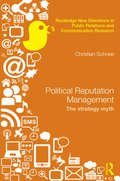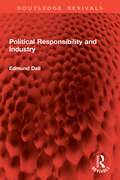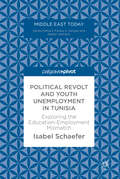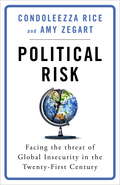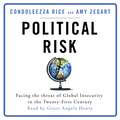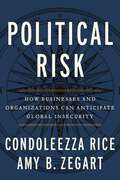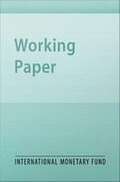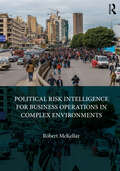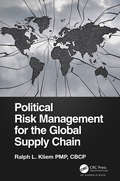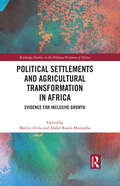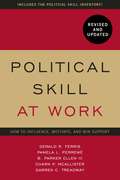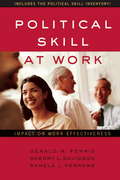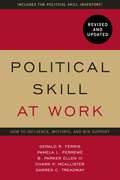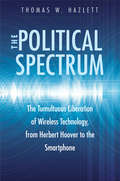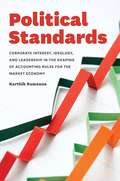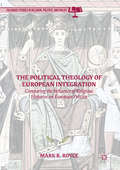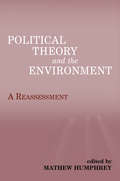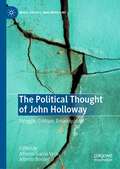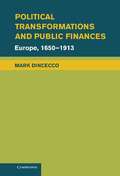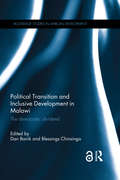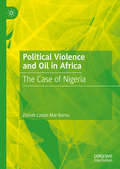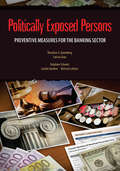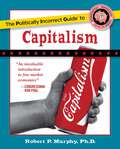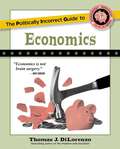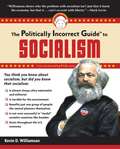- Table View
- List View
Political Reputation Management: The Strategy Myth (Routledge New Directions in PR & Communication Research)
by Christian SchneeIt is widely assumed that a competitive political environment of public distrust and critical media forces political parties to manage communications and reputations strategically, but is this really true? Comprehensive control of communications in a fast-moving political and media setting isoften upset by events outside the communicator’s control, taking over the news agenda andchanging the political narrative. Based on interviews with leading communicators and journalists, this book explores the tensions between a planned, strategic communications approach and a reactive, tactical one. The interviewees, who over the past 15 years have been instrumental in presenting and shaping the public persona of party leaders and Prime Ministers, include, amongst others, William Hague, Ian Duncan-Smith, Michael Howard, David Cameron, Tony Blair and Gordon Brown.It draws a unique picture of how political reputations are managed and, ultimately, confirms the discrepancy between what political communications management is thought to be, and how communications practitioners actually operate. This book empirically reviews political communications practice in order to analyse to what degree reality matches the concepts of strategic communications management. This will be essential reading for researchers, educators and advanced students in public relations, communications studies and marketing.
Political Responsibility and Industry (Routledge Revivals)
by Edmund DellFirst published in 1973, Political Responsibility and Industry discusses the nature of industrial policy and the capacity of the British governmental system to conduct it. This theme is illustrated by particular examples of the working of government-industry relations with which the author was intimately connected, such as the aluminium smelter project and the textile industry enquiry; and by discussion of particular instruments of industrial policy such as the Industrial Reorganisation Corporation and the Geddes Report on shipbuilding.The author is critical of the tendency to regard industrial policy as some new catalyst of industrial growth. He describes it, at its best, as simply ‘casework in the public interest’. In a penetrating analysis of the machinery of government in Britain, he shows that this is inadequate as an instrument for the effective control of industrial policy. This in turn leads on to a discussion of the ‘myth of ministerial responsibility’ which, the author suggests, rather than locating effective responsibility for policy, ensures that it is not located anywhere at all. The arguments presented should be of interest not only to those concerned with Government-industry relations, but to anyone worried about the working of Parliamentary government in Britain.
Political Revolt and Youth Unemployment in Tunisia
by Isabel SchaeferThis book discusses youth unemployment in post-revolutionary Tunisia, paying particular attention to the so-called skill mismatch. Youth unemployment was one of the major factors triggering the Tunisian revolution, and continues to be a central socio-economic challenge. The Tunisian labour market is marked by a strong increase of higher education graduates while the economic system is dominated by sectors mainly employing a less qualified labour force. This study investigates current labour market trends, and provides insights into the underlying causes of persisting high youth unemployment. The author argues that economic crisis, difficult political conditions since 2011, and inefficient labour market policies did not foster sufficient job creation, and that special attention needs to be paid to the educational causes of the skill mismatch in youth employment in future sustainable development models.
Political Risk: Facing the Threat of Global Insecurity in the Twenty-First Century
by Condoleezza Rice Amy ZegartPolitical risk - the probability that a political action could significantly affect an organisation - is changing fast, and it's more widespread than ever before.In the past, the chief concern used to be whether a foreign dictator would nationalise the country's oil industry. Today, political risk stems from a widening array of agents, from Twitter users and terrorists to hackers and insurgents. What's more, the very institutions and laws that are supposed to reduce uncertainty and risk often increase it instead. This means that in today's globalised world there are no 'safe' bets. Political risk affects companies and organisations of all sizes, operating everywhere from London to Lahore, even if they don't know it.Political Risk investigates and analyses this shifting landscape, suggests what businesses can do to navigate it, and explains how all of us can better understand these rapidly changing geopolitical dynamics.
Political Risk: Facing the Threat of Global Insecurity in the Twenty-First Century
by Condoleezza Rice Amy ZegartPolitical risk - the probability that a political action could significantly affect an organisation - is changing fast, and it's more widespread than ever before.In the past, the chief concern used to be whether a foreign dictator would nationalise the country's oil industry or impose onerous new regulations. Today, political risk stems from a widening array of political agents, from Twitter users and terrorists to local officials, transnational activists, hackers and insurgents. What's more, the very institutions and laws that are supposed to reduce uncertainty and risk often increase it instead. This means that in today's globalised world there are no 'safe' bets. Political risk affects companies and organisations of all sizes, operating everywhere from London to Lahore, even if they don't know it.Political Risk investigates and analyses this shifting landscape, suggests what businesses can do to navigate it, and explains how all of us can better understand and deal with these rapidly changing geopolitical dynamics.Read by Grace Angela Henry(P) Hachette book Group US 2018
Political Risk: How Businesses and Organizations Can Anticipate Global Insecurity
by Condoleezza Rice Amy B. ZegartFrom New York Times bestselling author and former U.S. secretary of state Condoleezza Rice and Stanford University professor Amy B. Zegart comes an examination of the rapidly evolving state of political risk, and how to navigate it.The world is changing fast. Political risk-the probability that a political action could significantly impact a company's business-is affecting more businesses in more ways than ever before. A generation ago, political risk mostly involved a handful of industries dealing with governments in a few frontier markets. Today, political risk stems from a widening array of actors, including Twitter users, local officials, activists, terrorists, hackers, and more. The very institutions and laws that were supposed to reduce business uncertainty and risk are often having the opposite effect. In today's globalized world, there are no "safe" bets.POLITICAL RISK investigates and analyzes this evolving landscape, what businesses can do to navigate it, and what all of us can learn about how to better understand and grapple with these rapidly changing global political dynamics. Drawing on lessons from the successes and failures of companies across multiple industries as well as examples from aircraft carrier operations, NASA missions, and other unusual places, POLITICAL RISK offers a first-of-its-kind framework that can be deployed in any organization, from startups to Fortune 500 companies.Organizations that take a serious, systematic approach to political risk management are likely to be surprised less often and recover better. Companies that don't get these basics right are more likely to get blindsided.
Political Risk Intelligence for Business Operations in Complex Environments
by Robert MckellarMacro-level dynamics and modelling are well represented in the mainstream political risk literature. However, not many writings on the subject get their hands dirty in terms of revealing the hard, nuanced and practical work behind knowing what the issues might be for a specific foreign operation in a sensitive or volatile context, and how to plan for them. Political Risk Intelligence for Business Operations in Complex Environments provides international managers, and by extension their organisations, with a foundational understanding of political risk analysis and planning for on-the-ground operations in challenging times and places. This means having a fluid grasp of what political risk means and why it matters in the organisation’s context, and how relevant intelligence can be gathered and analysed to inform decisions and planning towards an operation’s socio-political resilience. The book explains: How and why political risk manifests and the forms it can take Company attitudes and operational attributes as a political risk variable Understanding the operational implications of socio-political dynamics and trends Stakeholder identification and analysis for informed engagement planning Scenario analysis to prepare for long-term contingencies and discontinuities Holistic, intelligence-driven political risk management planning Tactical intelligence exercises to maintain awareness and inform adaptation Intelligence management, collection and quality control Ethical considerations in political risk management Rather than being bound by conventional notions of risk, the book emphasises the dynamic relationship between a foreign operation and its host environment and milieu as a source of both challenges and opportunities to manage them. Concepts, frameworks and practices are rounded out with real-world examples and relevant lessons from the author’s experience as a political risk consultant.
Political Risk Management for the Global Supply Chain
by Ralph L. KliemThe global business environment has never been so complex, making supply chains more fragile than ever. A stable business environment seems like a distant dream in today's global marketplace; instability, not stability, has become the norm. Anti-globalization and nationalization, coupled with populist movements and transnational terrorism, just to name a few targeting global supply chains, now pose significant challenges and risks when doing business across the globe. To address such issues, Political Risk Management for the Global Supply Chain: Provides an overview of basic political terminology and political risk management Presents the basic processes of political risk management Examines the current and future impacts of political events on global supply chains By putting aside the passions that politics can raise, the book aims to objectively look at political risk management. Topics covered include: Identifying different categories of political risk Understanding the relationship of political risk management, enterprise risk management, supply chain, project management, change management, and business continuity Laying the groundwork for efficient and effective political risk management Evaluating the effectiveness of responses The book begins with an overview on why political risk management is an important yet overlooked topic and the corresponding consequences if it is ignored or overlookedby enterprises and their global supply chains. Next, it provides systemic and systematic perspectives on political risk management and explains why the topic is more important than ever. Most important, it provides a framework that enterprises, regardless of nationality, can use to develop and deploy to manage political risks. The book concludes by discussing the full spectrum of developing, deploying, testing, and maintaining processes to conduct political risk management.
Political Settlements and Agricultural Transformation in Africa: Evidence for Inclusive Growth (Routledge Studies on the Political Economy of Africa)
by Martin Atela Abdul Raufu MustaphaThis book explores the ways in which political settlements can contribute to positive changes in Africa’s agricultural and manufacturing sectors. Contemporary Africa has seen many governments, donors, and commercial private enterprises supporting innovative agricultural and agro-processing schemes with the purpose of diversifying economies. However, many of the schemes collapse or at best fail to generate the needed jobs. Focusing on case studies in Kenya, Nigeria and Ethiopia, this book takes an interdisciplinary approach that combines econometric modelling research, life histories, policy approaches methods, and political economy theory to reframe the field with new questions. The contributors offer alternative explanations for the failure of employment creation schemes in Africa and show how political settlements can bring together stakeholders to settle on win-win approaches to productive employment schemes and inclusive development. Providing new insights on the political economy of agrarian and labour relations in Africa, this book will be of interest to policy actors and development practitioners wishing to support inclusive growth in Africa, as well as to scholars of African politics and economics, public policy and development.
Political Skill at Work: Impact on Work Effectiveness
by Sherry L. Davidson Gerald R. Ferris Pamela L. PerrewéIn today's organizations, career success depends more on political skill-the ability to influence, motivate, and win support from others-than on almost any other characteristic. Political Skill at Work delivers the "how" to influence at work, not just the "what." The authors of this innovative study explore how people high in political skill are more successful at getting hired, building a reputation, and establishing leadership. From the worlds of business, politics, education, and sports, they offer compelling examples of political skill in action. And, for the first time, they provide ways to measure and enhance this powerful ability. Anyone interested in personal or professional development will find this book worthwhile.
Political Skill at Work: Impact on Work Effectiveness
by Gerald R. FerrisIn today's organizations, career success depends more on political skill - the ability to influence, motivate, and win support from others-than on almost any other characteristic. Political Skill at Work delivers the "how" to influence at work, not just the "what." The authors of this innovative study explore how people high in political skill are more successful at getting hired, building a reputation, and establishing leadership. From the worlds of business, politics, education, and sports, they offer compelling examples of political skill in action. And, for the first time, they provide ways to measure and enhance this powerful ability. Anyone interested in personal or professional development will find this book worthwhile.
Political Skill at Work: How to influence, motivate, and win support
by Gerald R. Ferris Pamela L Perrewe Darren Treadway Charn McAllister Parker EllenPolitical skill is a characteristic that can facilitate good things for individuals and their organizations. Yes, it is possible that political skill can be used and to get away with self-serving acts at the expense of others, but contrary to the stereotypical perceptions of being political, political skill is about more than manipulation. In fact, political skill enables people to build trust and forge positive relationships, and leaders often need it to influence others and access resources critical to their teams' success. This edition has been revised and updated with more than 15 years of additional research on political skill, as well as new examples that demonstrate why, in today's organizations, career success depends more on political skill than on almost any other characteristic.
The Political Spectrum: The Tumultuous Liberation of Wireless Technology, from Herbert Hoover to the Smartphone
by Thomas Winslow HazlettFrom the former chief economist of the FCC, a remarkable history of the U.S. government’s regulation of the airwaves Popular legend has it that before the Federal Radio Commission was established in 1927, the radio spectrum was in chaos, with broadcasting stations blasting powerful signals to drown out rivals. In this fascinating and entertaining history, Thomas Winslow Hazlett, a distinguished scholar in law and economics, debunks the idea that the U.S. government stepped in to impose necessary order. Instead, regulators blocked competition at the behest of incumbent interests and, for nearly a century, have suppressed innovation while quashing out-of-the-mainstream viewpoints. Hazlett details how spectrum officials produced a “vast wasteland” that they publicly criticized but privately protected. The story twists and turns, as farsighted visionaries—and the march of science—rise to challenge the old regime. Over decades, reforms to liberate the radio spectrum have generated explosive progress, ushering in the “smartphone revolution,” ubiquitous social media, and the amazing wireless world now emerging. Still, the author argues, the battle is not even half won.
Political Standards: Corporate Interest, Ideology, and Leadership in the Shaping of Accounting Rules for the Market Economy
by Karthik RamannaPrudent, verifiable, and timely corporate accounting is a bedrock of our modern capitalist system. In recent years, however, the rules that govern corporate accounting have been subtly changed in ways that compromise these core principles, to the detriment of the economy at large. These changes have been driven by the private agendas of certain corporate special interests, aided selectively—and sometimes unwittingly—by arguments from business academia With Political Standards, Karthik Ramanna develops the notion of “thin political markets” to describe a key problem facing technical rule-making in corporate accounting and beyond. When standard-setting boards attempt to regulate the accounting practices of corporations, they must draw on a small pool of qualified experts—but those experts almost always have strong commercial interests in the outcome. Meanwhile, standard setting rarely enjoys much attention from the general public. This absence of accountability, Ramanna argues, allows corporate managers to game the system. In the profit-maximization framework of modern capitalism, the only practicable solution is to reframe managerial norms when participating in thin political markets. Political Standards will be an essential resource for understanding how the rules of the game are set, whom they inevitably favor, and how the process can be changed for a better capitalism.
The Political Theology of European Integration
by Mark R. RoyceThis book traces the connections between diverging postwar European integration policies and intra-Christian divisions to argue that supranational integration originates from Roman Catholic internationalism, and that resistance to integration, conversely, is based in Protestantism. Royce supports this thesis through a rigorously supported historical narrative, arguing that sixteenth-century theological conflicts generated seventeenth-century constitutional solutions, which ultimately effected the political choices both for and against integration during the twentieth century. Beginning with a survey of all ecclesiastical laws of seventeen West European countries and concluding with a full discussion of the Brexit vote and emerging alternatives to the EU, this examination of the political theology surrounding the European Union will appeal to all scholars of EU politics, modern theology, religious sociology, and contemporary European history.
Political Theory and the Environment: A Reassessment
by Mathew HumphreyThis collection offers a sympathetic but critical perspective on contemporary ecological political theory, and gives proposals for a reorientation of some of its key aspects.
The Political Thought of John Holloway: Struggle, Critique, Emancipation (Marx, Engels, and Marxisms)
by Alfonso García Vela Alberto BonnetThis book provides renewed reflection and critical discussion on John Holloway's political and theoretical thought. Two decades ago, in Change the World without Taking Power, Holloway set out on a path that he followed a decade later in Crack Capitalism and continues to walk today with his new book, Hope in Hopeless Times. The contributions in this volume critically analyze his innovative attempt to rethink the meaning and dynamics of revolution in the conditions of contemporary capitalism. More than ten years after the publication of Crack Capitalism, this volume aims to question Holloway's attempt, as well as his theoretical foundations in his original rereading of Marxism and Critical Theory and their relations with the characteristics adopted by the anti-capitalist struggles during the last two decades. Its authors, from different geographies, traditions, and scientific disciplines, establish throughout its pages a fruitful dialogue convened by Holloway's innovative ideas.
Political Transformations and Public Finances
by Mark DinceccoHow did today's rich states first establish modern fiscal systems? To answer this question, Political Transformations and Public Finances by Mark Dincecco examines the evolution of political regimes and public finances in Europe over the long term. The book argues that the emergence of efficient fiscal institutions was the result of two fundamental political transformations that resolved long-standing problems of fiscal fragmentation and absolutism. States gained tax force through fiscal centralization and restricted ruler power through parliamentary limits, which enabled them to gather large tax revenues and channel funds toward public services with positive economic benefits. Using a novel combination of descriptive, case study and statistical methods, the book pursues this argument through a systematic investigation of a new panel database that spans eleven countries and four centuries. The book's findings are significant for our understanding of economic history and have important consequences for current policy debates.
Political Transition and Inclusive Development in Malawi: The democratic dividend (Routledge Studies in African Development)
by Dan Banik Blessings ChinsingaMalawi is among the few countries in sub-Saharan Africa that has witnessed significant improvements in relation to meeting the Millennium Development Goal (MDG) targets. It exhibits some of the main challenges facing African democracies while they attempt to consolidate the benefits of democratisation. Political Transition and Inclusive Development in Malawi critically analyses opportunities and constraints related to the impact of democracy on development in one of the world’s poorest countries. The book explores how, and to what extent, processes related to democratic and economic governance can be strengthened in order to make political and administrative authorities more responsive to development needs. It also considers characteristics of successful implementation of public policy and the effective and timely delivery of basic services in local contexts; increased citizen participation and dialogue with local government authorities; factors that enable civil society organisations to hold political and administrative officials to account; and better utilisation of academic research for improved evidence-based policy formulation and implementation. This volume will be of great interest to scholars in development studies, African studies, politics, law and anthropology, as well as policymakers and those interested in democracy, governance, human rights and the implementation of anti-poverty programmes, development administration and decentralisation.
Political Violence and Oil in Africa: The Case of Nigeria
by Zainab Ladan Mai-BornuThe book argues that in order to better understand the undercurrents of the Niger Delta conflict, it is imperative to analyse the dynamics of choice in terms of the distinct courses of action taken by the Ogoni and Ijaw. Given the similar structural constraints, the author considers why the Ogoni adopted nonviolent resistance, and the Ijaw violent resistance. This book is divided into seven chapters starting with an introduction to oil and political violence in African conflicts, and includes a synoptic overview of four other resource-rich countries in Africa. Theoretical and conceptual underpinnings of conflict are then presented with the aim of situating the Niger Delta conflicts within the wider conflict literature. Chapter Three concentrates the discussion on the Nigerian Niger Delta, outlining the core issues at the centre of the contestations. The following three chapters offer an in-depth empirical analysis on the interaction between the narratives on nonviolence versus violence, the nature of leadership styles, and the organisation of the Ogoni and Ijaw movements along with a concluding chapter.
Politically Exposed Persons: Preventive Measures for the Banking Sector
by Theodore S. Greenberg Larissa GrayIn recent years, revelations of grand corruption and the plunder of state assets have led to greater scrutiny of financial relationships with politically exposed persons (PEPs)-senior government officials and their family members and close associates. Notwithstanding the efforts by many financial institutions and regulatory authorities to prevent corrupt PEPs from entering and using the financial system to launder the proceeds of corruption, there has been an overall failure in the effective implementation of international standards on PEPs. Implementation of an effective PEP regime is a critical component in the prevention and detection of transfers of proceeds of crime and, therefore, ultimately in the process of recovering them. 'Politically Exposed Persons: Preventive Measures for the Banking Sector' is designed to help banks and regulatory authorities address the risks posed by PEPs and prevent corrupt PEPs from using domestic and international financial systems to launder the proceeds of corruption. The book provides recommendations and good practices aimed at improving compliance with international standards and increasing supervisory effectiveness. It is an important tool for individuals, governments, financial and private sector companies, and international organizations involved in developing and implementing standards aimed at fighting corruption and money laundering, and trying to recover stolen assets and the proceeds of corruption.
The Politically Incorrect Guide to Capitalism (The Politically Incorrect Guides)
by Robert P. MurphyMost commonly accepted economic "facts" are wrong Here's the unvarnished, politically incorrect truth. The liberal media and propagandists masquerading as educators have filled the world--and deformed public policy--with politically correct errors about capitalism and economics in general. In The Politically Incorrect Guide(tm) to Capitalism, myth-busting professor Robert P. Murphy, a scholar and frequent speaker at the Ludwig von Mises Institute, cuts through all their nonsense, shattering liberal myths and fashionable socialist cliches to set the record straight. Murphy starts with a basic explanation of what capitalism really is, and then dives fearlessly into hot topics like:* Outsourcing (why it's good for Americans) and zoning restrictions (why they're not)* Why central planning has never worked and never will* How prices operate in a free market (and why socialist schemes like rent control always backfire)* How labor unions actually hurt workers more than they help them* Why increasing the minimum wage is always a bad idea* Why the free market is the best guard against racism* How capitalism will save the environment--and why Communist countries were the most polluted on earth* Raising taxes: why it is never "responsible"* Why no genuine advocate for the downtrodden could endorse the dehumanizing Welfare State* The single biggest myth underlying the public's support for government regulation of business* Antitrust suits: usually filed by firms that lose in free competition* How tariffs and other restrictions "protect" privileged workers but make other Americans poorer* The IMF and World Bank: why they don't help poor countries* Plus: Are you a capitalist pig? Take the quiz and find out! Breezy, witty, but always clear, precise, and elegantly reasoned, The Politically Incorrect Guide(tm) to Capitalism is a solid and entertaining guide to free market economics. With his twelve-step plan for understanding the free market, Murphy shows why conservatives should resist attempts to socialize America and fight spiritedly for the free market.
The Politically Incorrect Guide to Economics
by Thomas J. DiLorenzoAnother entry in the best-selling, irreverent, hard-hitting Politically Incorrect Guide series! Economics from a rational, conservative viewpoint—that is, a refreshing look at how money actually works from an author who knows the score, and how the law of economics are frequently broken and derailed by pernicious leftists and virtue signalling progressives.
The Politically Incorrect Guide to Socialism
by Kevin D. WilliamsonStalin's gulag, impoverished North Korea, collapsing Cuba. . . it's hard to name a dogma that has failed as spectacularly as socialism. And yet leaders around the world continue to subject millions of people to this dysfunctional, violence-prone ideology. In The Politically Incorrect Guide TM to Socialism, Kevin Williamson reveals the fatal flaw of socialism--that efficient, complex economies simply can't be centrally planned. But even in America, that hasn't stopped politicians and bureaucrats from planning, to various extents, the most vital sectors of our economy: public education, energy, and the most arrogant central-planning effort of them all, Obama's healthcare plan. In this provocative book, Williamson unfolds the grim history of socialism, showing how the ideology has spawned crushing poverty, devastating famines, and horrific wars. Lumbering from one crisis to the next, leaving a trail of economic devastation and environmental catastrophe, socialism has wreaked more havoc, caused more deaths, and impoverished more people than any other ideology in history--especially when you include the victims of fascism, which Williamson notes is simply a variant of socialism. Williamson further demonstrates: Why, contrary to popular belief, socialism in theory is no better than socialism in practice Why socialism can't exist without capitalism How the energy powerhouse of Venezuela, under socialism, has become an economic basket case subject to rationing and blackouts How socialism, not British colonialism, plunged the bountiful economy of India into stagnation and dysfunction--and how capitalism is rescuing it Why socialism is inextricably linked to communism If you thought socialism went into the dustbin of history with the collapse of the Soviet Union, think again. Socialism is alive and kicking, and it's already spread further than you know.
